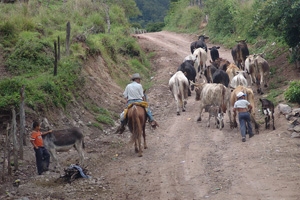International
Public Anthropology and Peace Corps

For many students, the drive to apply what they learn in the classroom in the world at large is undeniable. While the limitless internship opportunities in Washington present such opportunities, many students hunger to make an even larger impact. With its new international track public anthropology master’s degree in partnership with the Peace Corps, the College’s Department of Anthropology has answered this call.
“Our students consistently express their desire to use their skills to work directly with communities on the ground,” says international track coordinator and anthropology professor William Leap. “The Peace Corps provides access to these types of opportunities many times in the form of development projects that are already underway. Peace Corps volunteers can provide the technical and organizational assistance to move these projects forward.”
The program, designed to be completed over the course of three years including Peace Corps placement, provides students with key preparation to succeed while working at their site placements as well as the resources to use their experiences to make lasting change once they return.
In the first year, students complete core anthropology coursework designed to create a strong foundation in public anthropology methods and practices. Throughout the fall semester, students complete a Peace Corps application with the assistance of program coordinators Leap and Assistant Professor Adrienne Pine, as well as members of the program’s Advisory Board.
The Advisory Board consists of graduates of the department’s MA and PhD programs who have had Peace Corps experience, including Robert Minchon, currently a program manager at the National Institutes of Health Training Center who served in Lesotho from 1995 to 1997, and Bill Roberts, a professor of anthropology at St. Mary’s College of Maryland who served in the Gambia from 1979 to 1981. John Charles of the AU Career Center, who specializes in helping AU students with Peace Corps applications, will also assist students in the program. According to Leap, participation in this advising and preparation will weigh heavily on the Peace Corps’ admissions decision.
The spring before students leave for their placements, the department will help them pursue practical experience related to their placement within the metropolitan Washington area. For example, if a student will be working with schools during her placement, she may be given an opportunity to work as a teacher’s aide in a D.C. school to build teaching skills.
“We not only want to give students practical skills for their placements,” says Leap. “We want to help them build key portfolio skills that are going to help them be successful both in their placements and in their future work in the development field.”
After serving in their Peace Corps placements for three semesters (earning six credits for which they are exempt from paying tuition) students return to AU for a final semester in which they prepare and submit a final report on their Peace Corps experience, thinking critically about what successes, failures, and needs they observed while in their placements.
“The goal with the final semester,” says Leap, “is to help students to work to meet the needs they identify while in their placements. If, for example, a student is working in a school and observes that school financing is a major problem we can connect them with resources across the university, from the Kogod School of Business or School of Education, Teaching and Health for instance, to help them further explore this topic. This way, students don’t just learn what problems exist, they learn how to solve them.”
Students interested in the program need no prior experience in anthropology. According to Leap, more than half of all anthropology master’s students have bachelor’s degrees in other fields. “Anthropology trains students to be attentive to local conditions and to not assume that we know what a community needs,” says Leap. “Anthropologists put people first, learn how to listen to what people need, and work to help communities design the solutions that will be best for them.”
